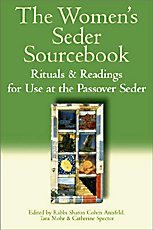"As we hear the breaking of the matzah, we remember the destruction and brokenness that war has brought to so many nations. Tonight, as we read the following reflection by playwright Eve Ensler, we remember not only the loss that we Jews have suffered in wars throughout centuries but also the shattered worlds that millions today must live in because of contemporary wars. We honor the healing work of women in these nations.
"When we think of war, we think of it as something that happens to men in fields or jungles. We think of hand grenades and Scud missiles. We think of the moment of violence — the blast, the explosion. But war is also a consequence — the effects of which are not known or felt for months, years, generations. And because consequences are usually not televised, by then the war is no longer sexy — the ratings are gone, consequences remain invisible. It is the bombing, the explosions in the dark, that keep us watching. As long as there are snipers outside of Sarajevo, Sarajevo exists. But after the bombing, after the snipers, that's when the real war begins.
"It is found in the broken-down fabric of community, in the death of trust, in the destruction of the everyday pattern of living. It is found in trauma and depression, poverty and homelessness and starvation. It is found in the emasculation and rage of the victim, in the new violence; the traumatized soldier beating his wife, the teenage boys already plotting revenge, the ongoing panic of children.
"When we think of war, we do not think of women. Because the work of survival, of restoration, is not glamorous work. Like most women's work, it is undervalued, underpaid, and impossible. After war, men are often shattered, unable to function. Women not only work, but they also create peace networks, find ways to bring about healing. They teach in home schools when the school buildings are destroyed. They build gardens in the middle of abandoned railroad tracks. They pick up the pieces, although they usually haven't fired a gun."
